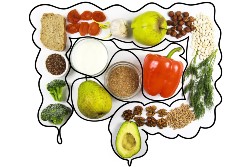Would you believe that your body houses a hundred trillion microorganisms, such as bacteria, viruses, and fungi? These microorganisms usually found in your large intestines make up your gut microbiome. Though one may think that they cause various diseases and illnesses, some are essential for the human body, especially when it comes to the immune system.
Did you know that 80 percent of your immune system resides in your gut? A good and healthy gut has a balanced amount of good and bad microorganisms in your digestive system.
The gut microbiome is responsible for many body functions, including metabolism and overall health and well-being. Without a balanced and healthy gut, your body’s immune defense will start to malfunction, resulting in poor health. You can achieve positive gut health by taking probiotic supplements and eating fermented foods, such as kefir, yogurt, and kimchi.
If you’re still not convinced about how important gut health is to the human body, here are some reasons you might want to consider:
1. A Healthy Gut Aids In Digestion
One of the main functions of the gut microbiome is to assist the human digestive system. Since healthy microbes thrive in the intestines, they can affect any food you eat, the nutrients your body absorbs, and the energy you store for other essential bodily processes.
Also, since the gut microbiome is home to different species of bacteria, it can help digest many kinds of food. For example, if you have a less diverse microbiome, it won’t be easy for you to metabolize hard-to-digest foods, particularly those rich in fiber.
The gut microbiome also affects the nutrients your body absorbs. If your body can digest a wide range of foods easily, then your body will be able to absorb more vitamins and minerals from these foods. On top of that, a healthy microbiome also helps prevent inflammation of your digestive tract by preventing and inhibiting the growth of pathogens, yeast, and other fungi.
Furthermore, if you want your body to digest foods quickly and effectively, you might need to consider establishing a healthy gut first.
2. A Healthy Gut Means Healthy Weight
Obesity is among the leading health issues across the world. This weight condition is a result of uncontrolled eating of unhealthy foods, genetics, or a combination of both.
In addition, they can also put one’s body at high risk of infection and other acquired diseases, such as diabetes, heart issues, and chronic disorders. Maintain a healthy and balanced weight by carefully considering all the food you eat.
According to experts, a healthy gut microbiome is proven to ease your metabolic activity, allowing you to digest more foods at a fast rate. Also, it aids in digesting compounds like fiber, which can help in weight loss.
As mentioned above, healthy microbes facilitate fiber digestion in the body. In addition, studies suggest that people who have a high fiber intake also have a balanced weight due to the presence of microbes in the gut.
What Bacteria Are Responsible?
Recent studies show two prevalent classes of bacteria that determine the amount of weight you can lose. These are Prevotella and Bacteroidetes. Prevotella is bacteria that digest fiber and carbohydrates efficiently. On the other hand, Bacteroidetes break down animal fats and proteins.
According to studies covering people who have a high fiber diet, people with an abundant amount of Prevotella in their gut show a significant decrease in weight than those with Bacteroidetes.
Furthermore, there are gut bacteria that can digest particular antioxidants called flavonoids. These antioxidants are usually found in plants and are hard to break down in sizes your body can absorb. Flavonoids are proven to aid in weight loss.
3. A Healthy Gut Prevents Intestinal Diseases
According to experts, a healthy gut may help prevent intestinal disorders, such as:
- Irritable Bowel Syndrome (IBS): An intestinal disorder that targets the colon, which symptoms may include stomach cramps, excessive gas, diarrhea, bloating, constipation.
- Ulcerative Colitis: This may cause sores and inflammation in the lining of your intestinal tract, which can be life-threatening in some cases. Unfortunately, there is no cure for this disease, so the best way to address this is to prevent the symptoms, including diarrhea, rectal pain and bleeding, defecation problems, etc.
- Crohn’s Disease: An inflammatory bowel disorder is a long-term medical condition that causes inflammation in the small and large intestines. Symptoms of Crohn’s disease may include ulcers in the intestinal tract, abdominal pain and discomfort, and diarrhea. In addition, it can be debilitating and life-threatening. So, it’s important to have support networks that understand the disease, such as doctors.
If you want to prevent these conditions, it would be best to have a balanced and diverse gut. Also, take note that the gas, bloating, and abdominal pain you might experience is because of gut dysbiosis. This means that bacteria in the gut produce excessive gas that results in such symptoms.
On top of that, specific types of bacteria can significantly improve overall gut health. These are called Bifidobacteria and Lactobacilli, which can be found in most fermented products, such as yogurt, aged meats, cheese, beer production, probiotics, and many more.
4. Gut Health Improves Cardiovascular Health
In recent years, researchers found out that there’s a strong link between gut microbiota and heart health. Studies show that an unhealthy gut may lead to cardiovascular conditions. This is because of an inflammatory marker, also known as trimethylamine-N-oxide (TMAO), which comes from bad gut bacteria.
According to experts, studies suggest that people with an unhealthy gut are at higher risk of heart diseases, such as stroke, cardiac arrest, and heart attack, compared to people who have well-balanced gut health. This is because of higher TMAO levels. With that said, managing TMAO may be the key to solving and improving heart conditions.
Gut Health Affect Blood Pressure
A healthy gut may also result in healthy and balanced blood pressure levels because of the short-chain fatty acids produced when the gut microbes digest high-fiber foods.
According to experts, these short-chain fatty acids may help regulate blood pressure by improving blood dilation and constriction. However, more studies are needed to develop a more decisive and straightforward conclusion.
The Role Of Probiotics
As mentioned above, probiotics may help prevent and reduce IBS symptoms and improve diarrhea. However, there are not enough cases to back up claims when it comes to heart health and functions. But one thing is for sure; probiotics are not recommended for treating or preventing heart issues.
Overall, keeping your heart healthy means having a high fiber intake to reduce the production of TMAO by bad bacteria, which shows a direct link between gut and heart health.
5. Gut Health May Improve Blood Sugar Levels And Reduce The Risks Of Diabetes
According to experts, a healthy gut with diverse microflora may also help you improve your blood sugar levels, reducing the risks of having type 1 or type 2 diabetes. The effects lie in eating fiber-rich foods, which successfully treat type 2 diabetes.
Recent studies suggest that the amount of fiber you eat may affect how bacteria in your gut thrive and function. Also, studies show that high fiber intake helps your body produce an anti-inflammatory serum called indole propionic acid.
Indole propionic acid is a metabolite produced by the good bacteria in your gut. A high concentration of this metabolite was found to help protect against both types of diabetes. Therefore, a higher fiber intake means a higher concentration of indole propionic acid.
Does It Affect Your Food Appetite?
If you have uncontrollable eating habits that often boost your blood sugar levels, it might be because of an unhealthy gut. A healthy gut may help you regulate your appetite by producing chemical signals.
These signals affect your feelings of hunger and satiety. When you have less diverse gut microbiota, you might get hungry quicker. But when you have a rich and well-balanced gut, you might feel more satiated.
On the other hand, your gut may produce protein peptides capable of regulating appetite by interfering with a normal appetite.
With that said, you can control your cravings by ensuring a wide range, diverse, and balanced gut microbiome. Furthermore, you may do this by taking probiotic supplements.
6. A Healthy Gut Improves Brain Health
Have you ever felt butterflies in your stomach? This is because your gut and brain are strongly connected. Also, studies suggest that gut health affects your brain and vice versa. This connection is also known as the gut-brain axis.
The Role Of Neurotransmitters In Gut And Brain
Neurotransmitters connect your gut and brain, regulating the production of important hormones that affect the body. For example, a large percentage of serotonin is produced in the gut. Serotonin is a hormone that makes people feel happy. Also, it can interfere with the body clock of a person.
In addition, the gut microflora can produce a compound called gamma-aminobutyric acid (GABA), an anti-anxiety and anti-seizure chemical. Furthermore, a study on rats shows positive results in controlling feelings of depression and anxiety.
Gut Microflora Produce Compound That Affects The Brain
As mentioned above, gut microbiota can produce short-chain fatty acids, such as butyrate and propionate, by consuming a high fiber diet. These fatty acids affect brain functions in some ways, such as:
- Forming Brain Barriers: Butyrate, together with gut microbes, may help your body form a shield to protect the brain from harmful compounds and substances from the blood. This protective layer is called the blood-brain barrier (BBB). Also, it makes sure to provide your brain with the essential nutrients and refines toxic chemicals from the brain to the bloodstream.
- Reducing Brain Activity: Propionate, on the other hand, helps you reduce brain activity due to high-energy foods, such as carb-rich foods. Also, it can help you reduce your food intake.
In addition, the gut microflora also breaks down amino acids and bile acids to create essential chemicals for the brain. According to experts, some studies in rats state that these compounds may help your brain reduce symptoms related to stress.

What Foods Help Improve Gut-Brain Connection?
Some groups of foods may be beneficial for gut-brain connection. These are the following:
- Omega-3-Rich Foods: According to experts, omega-3 fatty acids may diversify the presence of good bacteria in the gut microbiome in your intestine, reducing the risk of brain-related diseases.
- Fermented Foods: These foods are rich in essential bacteria that help improve digestion. Also, studies show that consuming fermented foods boosts and improves brain activity.
- Fiber-Rich Foods: These foods are rich in prebiotics, which are needed for the gut microflora to thrive and do their functions. Also, studies suggest that consuming prebiotics reduces stress.
- Foods High In Polyphenols: Polyphenols help improve the brain’s cognitive abilities, such as planning, critical thinking, reading comprehension, and experiential learning. You can get polyphenols in plant-based foods, such as cocoa, green tea, coffee, and olive oil.
How Can You Improve Gut Health?
Here are some ways you can improve and support your gut health:
- Consume a wide range of foods, such as fruits, vegetables, and fiber-rich foods.
- Invest in fermented foods, such as yogurt, kefir, sauerkraut, etc., which have a good amount of essential microorganisms.
- Reduce your consumption of artificially-sweetened foods, such as soda, to prevent the growth of bad bacteria.
- Increase your consumption of prebiotic foods, such as fiber to provide nutrients for the gut microbiome.
- Eat more whole-grain foods to maintain a healthy weight and reduce the risks of cancer and other diseases.
You may also consume probiotic supplements to replenish some good bacteria that were lost. However, it would be best to consult your doctor first to inform you how these can affect your body and to discover the possible side effects, if there are any.
Final Words
A healthy gut is composed of trillions of microorganisms, such as bacteria, fungi, viruses, and others. It plays an important role in digestion by breaking down hard-to-digest compounds like fiber.
Also, it helps your body maintain normal and healthy body weight by releasing compounds that interfere with your appetite. Not only that, but gut health is also responsible for making your brain and heart healthy.
On the other hand, an unhealthy gut system may lead to high blood pressure, increased blood sugar levels, brain disorders, and other medical conditions.
That being said, it’s important to make your gut microbiota diverse and healthy by consuming high fiber foods, fermented foods, fruits, and vegetables.








